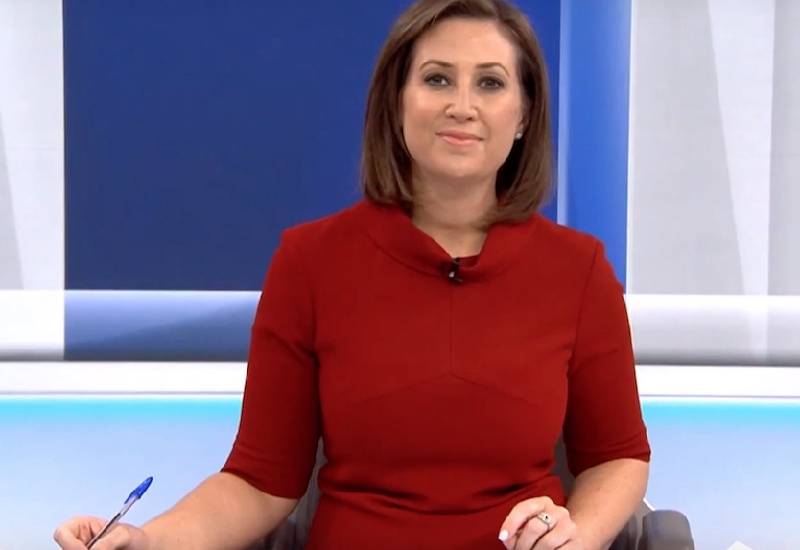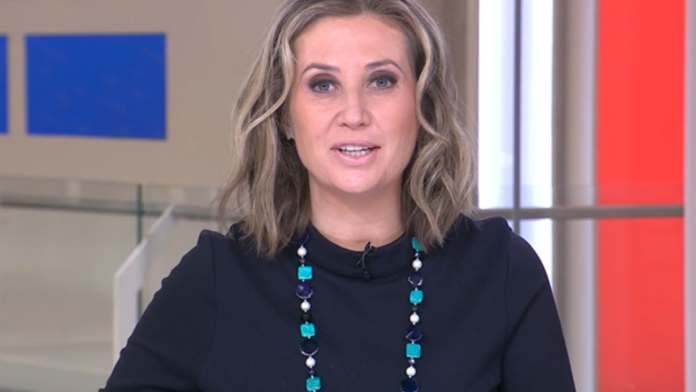If you watch international news, you’ve probably seen Kimberley Leonard anchoring, or heard her voice guiding you through breaking stories. But trust doesn’t come overnight. It’s built piece by piece through consistency, courage, and choices. Kimberley’s path from Nairobi to major news desks in the UK is one of those stories that shows how someone becomes more than a presenter; she becomes a trusted presence.
Roots in Nairobi More Than Just a Starting Point
Kimberley Leonard grew up in Lang’ata, a suburb of Nairobi, Kenya. Her father was a pilot (first for Air Kenya, then Safari Air), while her mother worked as a travel agent based out of Wilson Airport.
From childhood, she was surrounded by stories of movement people arriving, people departing, cross‑border connections. I believe that seeded in her both curiosity about the world and an understanding that perspectives matter. She went to Banda School and then Hillcrest International School in Nairobi.
Even early on, she wasn’t drawn to being “on‑camera fame” per se, but drawn to communication: telling stories, journalism, film. She once thought she might go into film. It was only after university, when she saw the chance to work with news and radio, that the journalism fire took hold.
First Steps Radio, Internships & Learning the Ropes
Her first professional real exposure was with Capital FM in Nairobi. At Capital FM she was part of the news team reading, reporting, understanding the rhythm of news, the pressure, the deadlines, the stakes.
She also did an internship at the Al Jazeera English bureau in Nairobi as the channel was launching. Internships are humble, sometimes unglamorous: long hours, fetching coffee, doing background research, but also observing closely how the international press handles credibility, sourcing, fairness. That experience matters a lot. It gives you thresholds what is acceptable, what is not.
So early on, Kimberley Leonard learned both technical skills (writing, reporting, production) and values: accuracy, clear communication, owning up to mistakes, respecting your audience. Those values would later be visible every time she signed on‑air.
Moving Beyond Kenya The Gulf & Wider Perspective
After Kenya, she moved to the Middle East to Dubai and then Doha. Working at Dubai Media Incorporated, Emirates News, then Al Jazeera English in Doha.
What’s important here: stepping into environments where the audience is multicultural, where issues are regional and global, not just local. News in the Middle East often comes with political sensitivities, cross‑cultural issues, diplomacy it forces you to sharpen your awareness. It forces you to report under conditions of scrutiny, sometimes of contention, and to weigh what you say, how you say it, how fast you say it. It teaches you grounding.
Kimberley Leonard used that time to build credibility: tackling stories not only from a regional angle but often linking them back to global audiences. Interviewing business leaders, doing human‑interest pieces, aviation stories (in the Gulf, aviation is a big thing) etc.
The Sky News Chapter Visibility, Consistency, High Stakes
In 2015, Kimberley joined Sky News UK. That was a big moment. Sky News is very visible: UK, Europe, other territories. When you’re anchoring there, you’re not just competing for ratings; you’re representing reliability. You’re part of people’s routines their morning check‑ins, their trusted updates through turmoil. Every opening, every live segment, every breaking story: it’s live, and mistakes or misreporting get noticed.
At Sky News, Kimberley Leonard anchored several programs: Sky Midnight News, Sky World News, sometimes press previews, live rolling news. She showed a few qualities that won trust:
- Composure under pressure: When breaking news happens disaster, crisis, political shocks anchors are tested. Kimberley’s steadiness, clarity, not panicking, not sensationalizing, helped people trust her.
- Clarity & fairness: Not over‑simplifying complex matters, but translating them. Letting evidence speak. Asking the right clarifying questions when interviewing. Not inserting undue bias. That matters hugely to viewers.
- Consistency: She showed up. She anchored a lot. Evening, midnight, early morning. She did live interviews, field pieces. The more people see you reliably, the more trust accrues.
- Authenticity / personal tone: Although anchors have to maintain professional distance, there are moments when humanity shows sometimes in tone, sometimes in small acknowledgments. Kimberley has spoken openly in interviews about home, about her roots, about the preparation she does, about things that move her. Viewers sense that. It enriches trust.
Leaving Sky News What It Means for Trust
In August 2023, she officially left Sky News, after about seven years. That move was significant: people wondered, What’s next? But leaving the anchor desk doesn’t erase the trust she’s built. In fact, it underscores something: she left having earned respect. Her departure was covered by many outlets.
What helps maintain trust after such a move is how you conduct yourself outwards: continuing to engage with issues that people care about, not being seen as abandoning standards, choosing new roles aligned with your public identity. From what she’s said in interviews, Kimberley Leonard has always been conscientious about her choices.
What Makes Viewers Trust Her Lessons From Her Journey
From watching her career, and from what she’s said, here are the things I think made her someone people believe in:
- Authenticity rooted in origin
She doesn’t hide where she comes from. Her childhood in Nairobi, parents’ professions, siblings she shares these. That grounds her in reality. When someone feels they’re not trying to pretend, people respond. - Strong ethical foundation
The way she’s handled interviews, the care she takes in preparing, the seriousness she gives to humanitarian angles alongside political ones these show respect for viewers, respect for truth. - Adaptability
Working in Kenya, then Dubai, then Doha, then UK each context is different: audience expectations, media norms, limits on freedom of the press, editorial framing. Learning to adjust without losing core principles builds credibility. - Consistency over time
It’s not about one big hit; it’s about showing up, doing the job well week after week. Viewers begin to trust someone they see regularly during big moments and mundane ones alike. - Vulnerability at times
Not always perfect, not always detached. In interviews she has talked about things that moved her to tears live on air, or the personal cost of being away from home, or learning curves. That vulnerability (balanced) makes a person approachable as well as trustworthy. - Preparing & knowing your material
She’s said she “creates a safety net” ahead of big interviews, does her homework, sources properly. When you see an anchor who understands issues deeply, that shows. Mistakes are fewer, phrasing is sharper, and even when things go wrong (they sometimes will), there’s confidence.

What It Cost, and Why It Matters
Trust doesn’t grow without cost. In Kimberley Leonard’s case:
- Long hours, time zones – Live rolling news means odd hours, wake‑ups, constant readiness.
- Separation from home or family – Working internationally often means being far from family, friends; that can be taxing.
- Emotional load – Covering tragedy, breaking disasters, human suffering takes a toll. Reliability and composure don’t erase the emotional weight behind the camera.
- Scrutiny – Being in visible roles means mistakes are amplified. One misstep can cost credibility. So there’s always pressure.
Yet, these costs also deepen trust: when people see someone still delivering, still showing up with integrity, despite the difficulties, it resonates. It says: this person values the role, not just the spotlight.
Why People Regard Her as “Trusted”
Putting together all of the above, here’s what makes Kimberley Leonard more than just another anchor:
- Global outlook with local heart — She carries her Kenyan roots visibly. Yet she also operates fluently in global media settings. That dual perspective helps her convey global stories in ways that connect locally.
- Authoritative but accessible — Viewers hear that she knows what she’s talking about, but she doesn’t act like she’s above you. The tone is important: clear, honest, sometimes warm, sometimes reflective.
- Supposed fairness & reliability — She hasn’t been embroiled in controversial sensationalism or been known for overly partisan positions. That helps: viewers who want simply the facts, context, clarity trust someone who seems neutral in the right sense.
- Reputation among peers — It’s not just public trust. Colleagues in the media know what it takes to do broadcasting well. Kimberley is respected for her professionalism. That influences how others speak of her, which in turn affects public perception.
- Continuing evolution — Even after leaving Sky News, people watch what she does. If she stays committed to journalistic values, explores new roles (documentaries, podcasts, mentoring, whatever comes next) with the same care, people will continue trusting what comes from her.
Looking Ahead What Her Future Must Do to Maintain That Trust
Leaving Sky News doesn’t close the book. If I were advising or watching:
- She should keep aligning with projects that reflect her values: truth, fairness, human stories.
- Be transparent with audience: when uncertain, say so; when wrong, correct. That builds credibility more than pretending perfection.
- Engage with communities not just as a reporter but as a listener. Trust often grows when you show you hear people, their concerns.
- Choose roles thoughtfully sometimes less visibility can allow more depth (e.g. long‑form reporting, documentaries), which can deepen trust even if reach is smaller.
- Preserve boundaries for well‑being because burnout or loss of balance can degrade both performance and authenticity.
Conclusion
Kimberley Leonard’s journey from Nairobi to Sky News is more than “overnight success.” It’s also not just about her voice or looks or being on TV. It’s about choices, preparation, respect, consistency, community. All these build up into someone people don’t just recognise, but believe in.
For many viewers she has become a touchstone in uncertain times: when things are confusing, when facts are disputed, when the world seems volatile. Knowing someone who shows up, who has earned the right to speak, who stays calm, who takes stories seriously that brings comfort and trust. And that’s what Kimberley Leonard has become: not just a trusted face on global news, but someone people look to, believe in, and respect.


